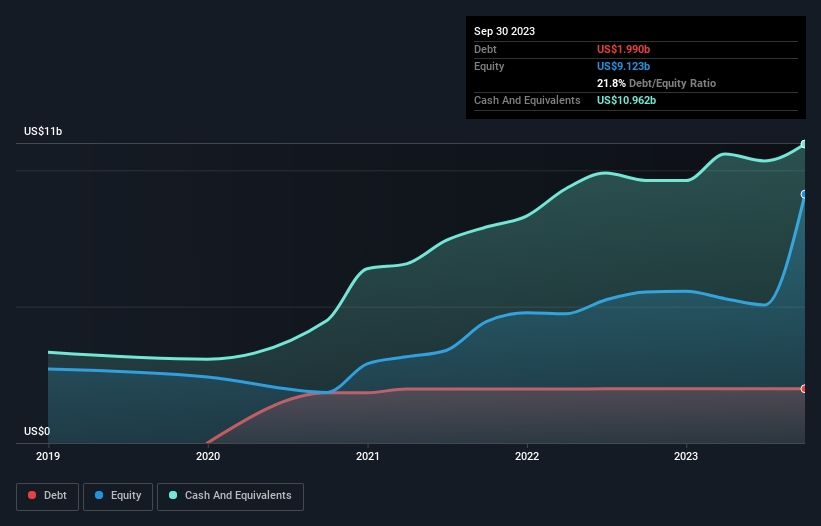
Warren Buffett famously said, 'Volatility is far from synonymous with risk.' It's only natural to consider a company's balance sheet when you examine how risky it is, since debt is often involved when a business collapses. As with many other companies Airbnb, Inc. (NASDAQ:ABNB) makes use of debt. But is this debt a concern to shareholders?
Why Does Debt Bring Risk?
Debt and other liabilities become risky for a business when it cannot easily fulfill those obligations, either with free cash flow or by raising capital at an attractive price. Part and parcel of capitalism is the process of 'creative destruction' where failed businesses are mercilessly liquidated by their bankers. While that is not too common, we often do see indebted companies permanently diluting shareholders because lenders force them to raise capital at a distressed price. Of course, plenty of companies use debt to fund growth, without any negative consequences. The first step when considering a company's debt levels is to consider its cash and debt together.
View our latest analysis for Airbnb
How Much Debt Does Airbnb Carry?
The chart below, which you can click on for greater detail, shows that Airbnb had US$1.99b in debt in September 2023; about the same as the year before. But on the other hand it also has US$11.0b in cash, leading to a US$8.97b net cash position.

A Look At Airbnb's Liabilities
The latest balance sheet data shows that Airbnb had liabilities of US$9.82b due within a year, and liabilities of US$2.50b falling due after that. Offsetting these obligations, it had cash of US$11.0b as well as receivables valued at US$206.0m due within 12 months. So it has liabilities totalling US$1.15b more than its cash and near-term receivables, combined.
This state of affairs indicates that Airbnb's balance sheet looks quite solid, as its total liabilities are just about equal to its liquid assets. So it's very unlikely that the US$94.6b company is short on cash, but still worth keeping an eye on the balance sheet. Despite its noteworthy liabilities, Airbnb boasts net cash, so it's fair to say it does not have a heavy debt load!
Another good sign is that Airbnb has been able to increase its EBIT by 30% in twelve months, making it easier to pay down debt. The balance sheet is clearly the area to focus on when you are analysing debt. But it is future earnings, more than anything, that will determine Airbnb's ability to maintain a healthy balance sheet going forward. So if you're focused on the future you can check out this free report showing analyst profit forecasts.
Finally, a business needs free cash flow to pay off debt; accounting profits just don't cut it. While Airbnb has net cash on its balance sheet, it's still worth taking a look at its ability to convert earnings before interest and tax (EBIT) to free cash flow, to help us understand how quickly it is building (or eroding) that cash balance. Happily for any shareholders, Airbnb actually produced more free cash flow than EBIT over the last two years. That sort of strong cash conversion gets us as excited as the crowd when the beat drops at a Daft Punk concert.
Summing Up
While it is always sensible to look at a company's total liabilities, it is very reassuring that Airbnb has US$8.97b in net cash. The cherry on top was that in converted 190% of that EBIT to free cash flow, bringing in US$4.2b. So we don't think Airbnb's use of debt is risky. There's no doubt that we learn most about debt from the balance sheet. But ultimately, every company can contain risks that exist outside of the balance sheet. These risks can be hard to spot. Every company has them, and we've spotted 1 warning sign for Airbnb you should know about.
If, after all that, you're more interested in a fast growing company with a rock-solid balance sheet, then check out our list of net cash growth stocks without delay.
New: Manage All Your Stock Portfolios in One Place
We've created the ultimate portfolio companion for stock investors, and it's free.
• Connect an unlimited number of Portfolios and see your total in one currency
• Be alerted to new Warning Signs or Risks via email or mobile
• Track the Fair Value of your stocks
Have feedback on this article? Concerned about the content? Get in touch with us directly. Alternatively, email editorial-team (at) simplywallst.com.
This article by Simply Wall St is general in nature. We provide commentary based on historical data and analyst forecasts only using an unbiased methodology and our articles are not intended to be financial advice. It does not constitute a recommendation to buy or sell any stock, and does not take account of your objectives, or your financial situation. We aim to bring you long-term focused analysis driven by fundamental data. Note that our analysis may not factor in the latest price-sensitive company announcements or qualitative material. Simply Wall St has no position in any stocks mentioned.
About NasdaqGS:ABNB
Airbnb
Operates a platform that enables hosts to offer stays and experiences to guests worldwide.
Excellent balance sheet with reasonable growth potential.

